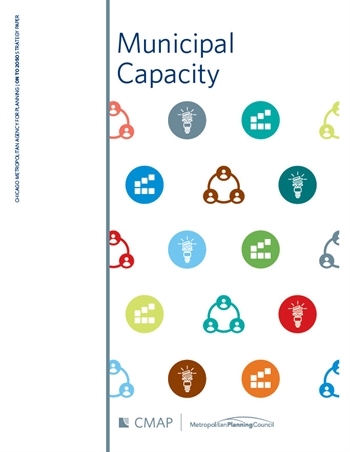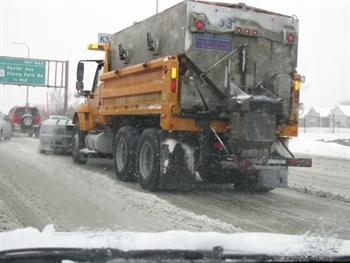From MPC’s perspective, variations in municipal capacity impede our ability to advance policies and practices related to basically all of our issue areas—reducing flooding, providing quality housing, investing in our infrastructure, and more. Josh Ellis examines this in detail, and articulates MPC's path forward.

When local government finances take a hit, so does the ability to get things done, whether it's creating jobs, enhancing our environment or educating our future workforce. Flickr user George Estreich (CC).
It’s safe to say that, among the 280+ individual cities and villages in northeastern Illinois, their capacity to get stuff done varies greatly, as do the reasons for that variation.

MPC and CMAP recently collaborated on a Municipal Capacity strategy paper to inform ONTO 2050.
Maybe it’s due to an insufficient tax base, or overdependence on one specific form of taxes, or, all too often, large amounts of debt. It could have to do with staffing, technology and even the size of the problem at hand vs. the size of the municipality. At any rate, while no two municipalities are the same, there are many that simply cannot do everything they might like to meet the needs of their residents, businesses, visitors and ecosystems, let alone achieve their long-term strategic visions for themselves.
A strategy paper by MPC and the Chicago Metropolitan Agency for Planning (CMAP) released at the end of 2017 delves into this much, much further, as does a recent post by MPC’s newest addition, Bob Dean. The paper includes background dissecting the variation in capacity, as well as an array of recommendations about what we should collectively do about it. And in 2018 MPC, working with CMAP and many others, is going to be doing a lot. In addition to adding Bob to our team, we’ll be advising two clusters of southwest suburban communities on coordinated water management, lending a hand as McHenry County and the McHenry County Council of Governments explore service sharing, and more.
All of which is good, meaningful work, and honestly, just the tip of the iceberg. There’s no shortage of opportunities to support greater municipal capacity, which was made immensely and immediately clear through the dozens of focus groups and interviews MPC and CMAP conducted for our aforementioned strategy paper. During that process we spoke with dozens of mayors and village presidents, senior staff, independent consultants and more to understand in greater detail what insufficient capacity costs our region’s communities. Essentially, what would you do that you can’t do now? The results themselves were varied, but did seem to fall into a few categories that illuminate why bolstering capacity is critically important.
Negotiate complex economic development deals
One community in southern Cook County noted that, while it has good Metra access and service, it has relatively little transit-oriented development (TOD) and the benefits that brings (i.e. tax revenues, jobs, homes, active pedestrian environment, etc.). This is because much of the land surrounding the Metra station is owned by another unit of government, in this case a park district. If this park land were actively programmed or ecologically sensitive, that might be the end of the discussion, but it isn’t. It’s simply a grassy lot that provides some aesthetic and environmental benefit, but not much else - there aren't even swings. With additional staff capacity (and the right skill set and training), it’s entirely possible that this community could negotiate with the park district for a land swap, pursue TOD with high standards for on-site green space, and help plan a more ecologically, aesthetically and recreationally pleasing park facility somewhere else.
Get started on service sharing
Northeastern Illinois has some great examples of municipalities developing service sharing agreements with each other, perhaps none so well documented as the Municipal Partnering Initiative, which was launched many years ago by the Village of Glenview and some key staff that had had experience in service sharing from previous jobs. But in many other parts of the region, we heard a common refrain in our focus groups: “That sounds great, I would have no idea how to start.” Point taken. If your historic norm is to work independently from (or, in some instances, in competition with) your neighbors, then being the community that starts dialog among a cluster of towns about a joint contract for tree trimming or road resurfacing can certainly be unnatural, if not daunting. We also couldn’t find much in the way of a primer for communities looking to get started, either. Perhaps that means it’s time to start thinking about writing Shared Services 1-2-3, but it’s also worth thinking about how a county, council of government, regional entity or civic organization might provide staff assistance to broker and initiate these sorts of agreements between communities who just don’t quite know how to start.
Get more formal without going nuts on the paperwork and lawyer fees

Casual sharing of capital equipment between communities is efficient, but what happens when someone hits a tree?
We also heard many, many stories about inter-municipal sharing of capital equipment—from plows to sand bags to meter readers—that were more or less formed on handshake agreements. This is in general a good thing, as it reduces redundancies and costs, but there is some inherent risk. If Town X’s plow is very nicely helping clear Town Y’s streets after a storm, and happens to run over a fire hydrant (or worse) without any sort of intergovernmental agreement, memorandum of understanding or other contract in place… that’d be trouble. Additionally, what if this whole deal is based on the trust between two public works managers, and one of them retires? Town Y could suddenly be out a plow. So, while there’s a general desire to continue these relatively informal arrangements, there’s a simultaneous desire to provide some degree of risk abatement, without being too onerous. That takes some brokering or template agreements to work from, and that can exceed the capacity of many communities.
These sorts of issues popped up in our discussions throughout the region, from towns in the inner core of Cook County to exurban and rural communities in McHenry and Will. And they’re the sorts of things that slip through the cracks because there’s no staff time, or technical know-how, or no political bandwidth to deal with. The development deals don’t get done, the services don’t get shared, and just when you need them most, the roads don’t get plowed. The reasons for insufficient capacity are complex, but we know what they we are and we have many, many examples of communities finding creative ways to overcome them.
From MPC’s perspective, these variations in municipal capacity also impede our ability to advance policies and practices related to basically all of our issue areas—reducing flooding, providing quality housing, investing in our infrastructure, and more. That’s at the heart of our increasing focus on this fundamental challenge of bolstering municipal capacity and our commitment to no longer resigning ourselves and our partners to “we would if we could, but we can’t so we won’t.” We can, so let’s do.